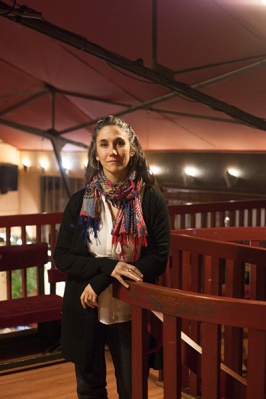 Paula Giusti's "The Government Inspector"
Paula Giusti's "The Government Inspector" Argentina stages a Russian play in French
Paula Giusti presents Nikolai Gogol's "The Government Inspector", a cruel and poetic comedy satirizing political corruption. Discover the Argentinian stage director who joined Molière's language to the satirical text of a Russian author.
The theatre as a bridge between Argentina and France
Born in Tucumán, Argentina, Paula Giusti has studied theatre in the Faculty of Arts for five years. In 2000, she chose to continue her studies in France. "I fell in love with French language watching French movies. For me, learning this language was a real linguistic challenge" says Paula Giusti. After having passed a DEA degree (equivalent of a Master today) at the Paris 8 university, she trained in the institution "L’Œil du Silence" (the eye of silence).
In Mnouchkine's footsteps
In 2004, Paula Giusti created the theatre company Toda Vía Teatro. She is then noticed by Ariane Mnouchkine during the Premiers Pas festival (First Steps festival) and presents in the Théâtre du Soleil her first creation, Agota Kristof's The Notebook. Her career starts. "France sees cultural value in theatrical creation. The country offers structures that allow theatre companies to work in continuity" the stage director explains. "In Argentina, actors must have a side job to survive."
The Government Inspector: laugh as a political weapon
Since January 15th, Paula Giusti presents Nikolai Gogol's "The Government Inspector" in the Théâtre de la Tempête. In this satirical text written in 1836, the author mocks the corrupted leaders of a Russian province. The arrival of the government inspector creates mayhem in the lives of the judge, the mayor, the physician, etc. Their mischiefs could be discovered. The following confusion leads to a misunderstanding: the so-called government inspector is in fact just a passing street artist.
Using mockery, Gogol also strongly criticises power and corruption. Through this adaptation, Paula Giusti develops the poetic aesthetics that can already be seen in The Notebook. Without compromising the integrity of the text, she also explores humour.
A puppet as a metaphor of power
"My goal is not to stick to the text" says Paula Giusti, "I rather use my dramatic quality in the work with the actor." On the stage, eight actors play in a simple set structured by removable doors. Painted in white, wearing a fake nose, each character is a caricature of himself. Mimics, grimacing and the use of the grotesque in general remind the commedia dell'arte.
But the actors' virtuosity can really be seen when the puppet appears. Using a puppet to create the fake government inspector is a metaphor of the political power that manipulates the masses and is in turn manipulated. In choral scenes, each actor gracefully pulls the puppet strings. The play thus becomes a puppet show, each character manipulating another.
Two dense hours marked by bursts of laughter during which borders vanish: here is a tango move, actors speak with a Spanish tone… "This story occurs in a city somewhere between Russia and Argentina", says a text at the beginning of the story. Paula Giusti holds true to her word: through her graceful staging, Gogol's satire gets universal accents.
